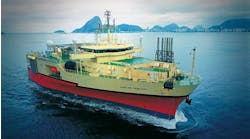Oil and gas companies need to adapt to attract digital natives
With the emergence of digitization, Big Data, artificial intelligence and the increased use of automation, the oil and gas industry is examining how these advanced, and sometimes disruptive, technologies will play a role in improving performance and securing a long-term future. Albeit one that eventually will represent a very different industry from today. Even in the interim, while hydrocarbons still represent a large proportion of product, increased digitization is driving greater innovation and improving productivity and efficiency in the field.
In any industry, people are the most important commodity. When it comes to implementing the digital strategies that oil and gas companies are pursuing to improve operational efficiency and retain profitability, people are even more important.
The trepidation for the industry is that the skills required for this new age of digital oil and gas differs immeasurably from what has long been the traditional skillset and largely resides with a younger generation. Failing to elevate the skills of a workforce is the most common pitfall in unsuccessful transformations. To advance the skills needed in the oil and gas market will require a combination of recruiting fresh talent from outside the industry – including data scientists, software engineers, and other digitally savvy professionals – as well as recent graduates, plus updating skills for operational staff already within the industry. Disciplines include digital risk security, cloud architecture and infrastructure, control networks (SCADA), robotics, and Progressive Web applications.
The requirement for younger, technologically savvy individuals is compounded by the natural but significant attrition from the industry of retirement-age oil and gas employees – or the “Great Crew Change” – with the potential loss, not of digital skills, but of process know-how that technology will enable and advance.
With impending knowledge loss and digitization gaining ground, now is the time to recruit new talent from the vast amount of highly capable people available but who may not have considered the oil and gas industry as a potential employer.
Petroplan, an oil and gas recruitment company, produced its second Talent Insight Index earlier this year. A key finding was that digital natives may not be looking at the oil and gas market as a career choice, verifying earlier indicators within the industry.
While attracting younger, digitally-conversant talent is undoubtedly a challenge facing many industries, it is somewhat more of a concern for the oil and gas industry. In 2016, Bob Dudley, chief executive of BP, forewarned that the oil and gas industry was in jeopardy of falling behind in the competition to attract talented younger employees. Citing a McKinsey research study listing the industry sectors where digital natives (often synonymously referred to as “Generation Y” or “millennials” and born between 1982 and 2004) would least like to work, he announced that the dubious honor went to the oil and gas industry – with 14% of respondents admitting they would not seek a career in the sector, due to its perceived negative image. This negative response was higher than for any other industry, including defense – and considerably higher than banking. In a further study from EY the news got worse with the generation after millennials, commonly referred to as ‘Z’, rejecting the idea of oil and gas careers.
Millennials are often mistakenly considered to be recent university graduates, but they are now occupying junior to mid managerial roles and are beginning to ascend into executive ranks. According to McKinsey’s report, millennials will constitute a majority of the US workforce by the early 2020s. They have already formed their own attitudes and viewpoints around a host of work-related issues from sustainability, ethical work structures and accountability to diversity, equality, and technology. In addition, they are not only very different from those of the baby boomer generation, but will come to define corporate culture going forward.
However, most oil and gas companies do not find themselves in this position and need to take urgent steps to foster the internal changes required to attract millennials. They also need to take a more proactive approach to specifically seeking out technologically advanced candidates from other sectors.
The industry also needs to take a fully engaged, hands-on approach to recruiting IT-based technology graduates in addition to the latest engineering high flyers. It needs to direct its recruiters to do the same, reaching out to universities and colleges to communicate that the oil and gas industry is a vibrant, relevant, and rewarding industry. Some academic institutions based in oil and gas hubs such as Houston are looking to expand their offerings around data science. Rice University, for example, has an initiative to significantly grow its faculty in this discipline with a view to supporting Houston’s major industries.
Millennials will be a powerful generation of workers and that those with the right skills will be in high demand. As well as commanding strong remuneration packages, they will have influence over how and where they participate in the workplace.
However, to attract and retain the next generation of engineering and leadership talent, oil and gas companies need to work harder on understanding their motivations. They will also need to make deeper changes to their organization and cultural constructs to meet the younger generation’s needs for meaningful work and social responsibility - and they will need to actively seek candidates from beyond the usual energy-based hunting grounds.
There is a significant amount of transformation and innovation happening in the oil and gas industry which if harnessed and well communicated should engage millennials, but companies need a clear and attractive storyline.
Huw Rothwell
Managing Director - North America
Petroplan
This page reflects viewpoints on the political, economic, cultural, technological, and environmental issues that shape the future of the petroleum industry. Offshore Magazine invites you to share your thoughts. Email your Beyond the Horizon manuscript to David Paganie at[email protected].


